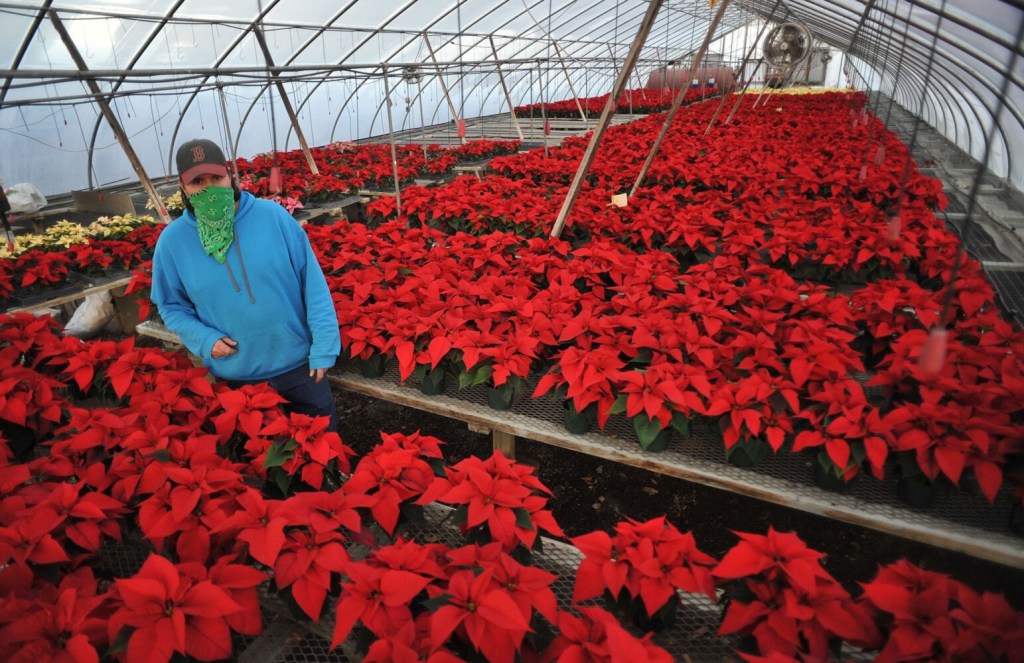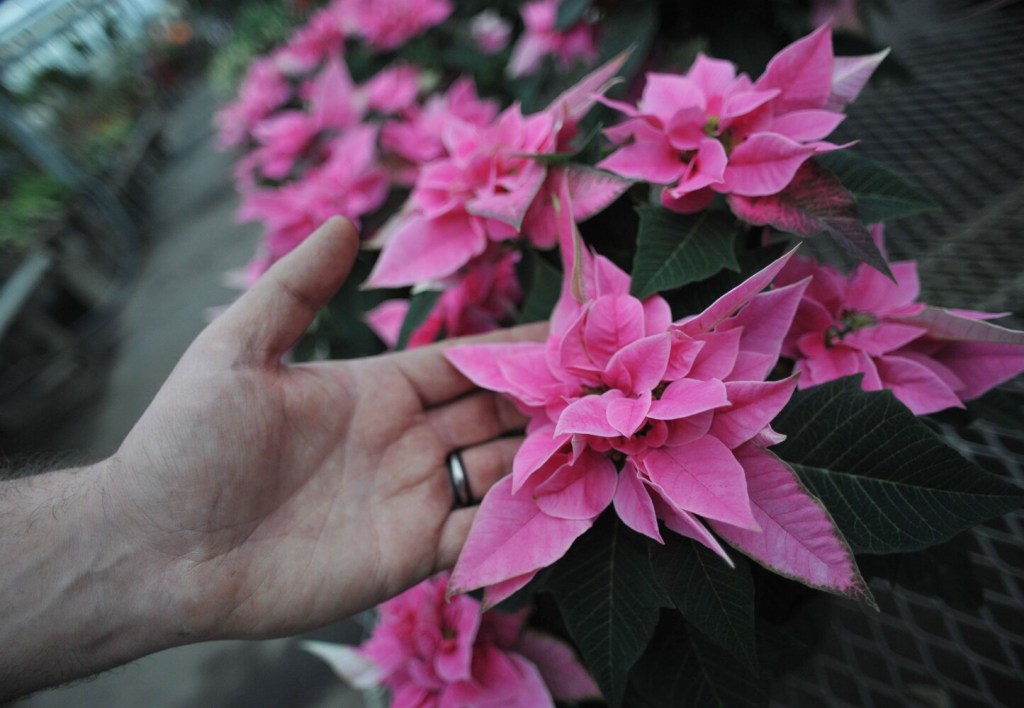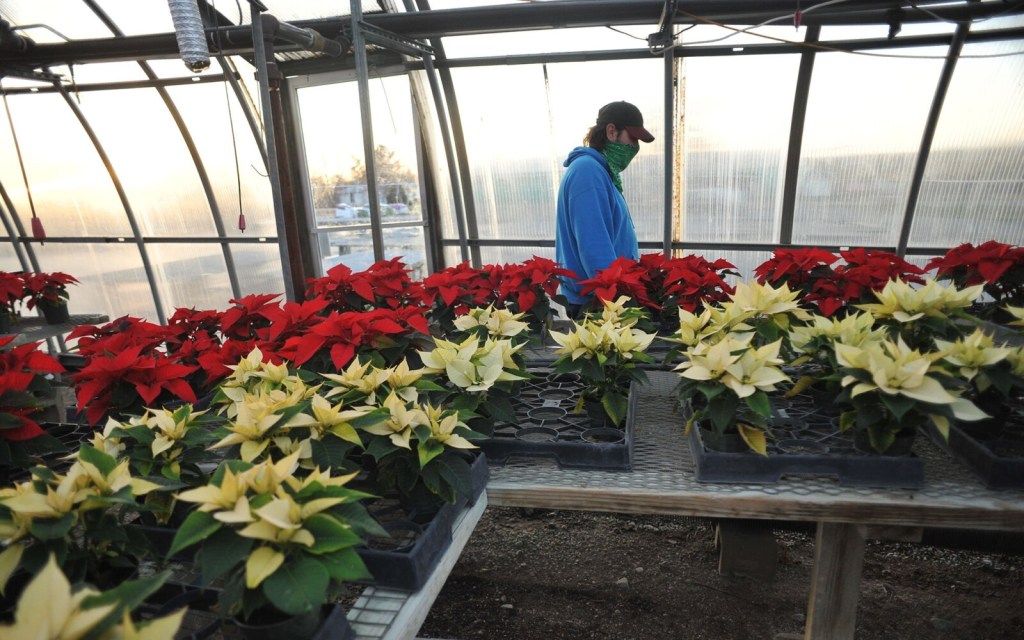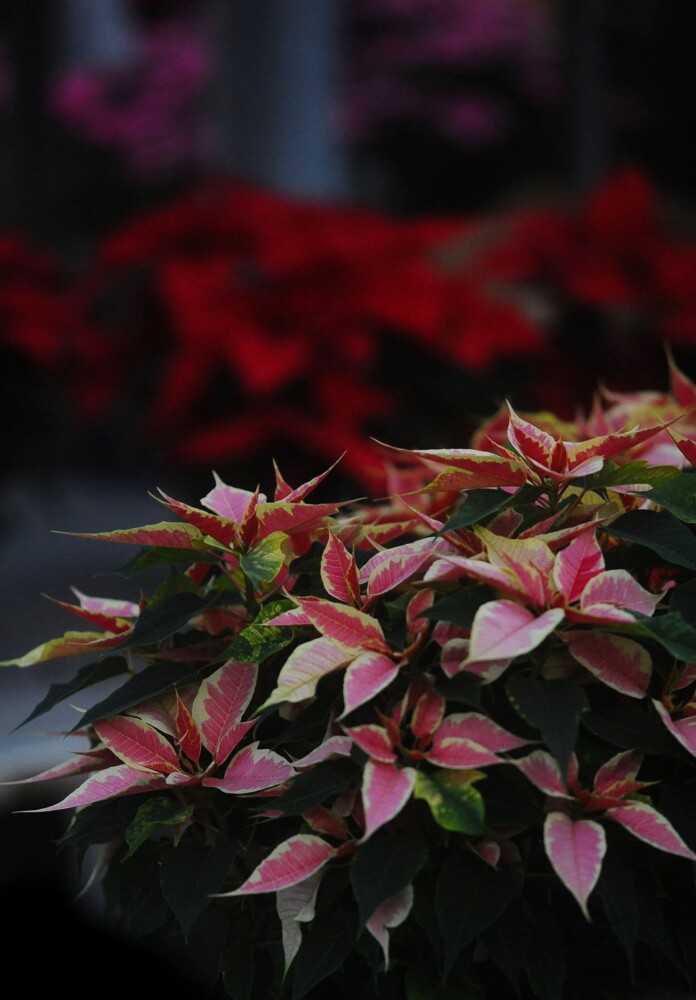At Sunset Flowerland and Greenhouses in Fairfield, having 1,000 extra poinsettia plants makes for a beautiful photo.
But greenhouse manager Harlan Benner needs to figure out what to do with them.
“We’ve had these fundraiser and church accounts for years and years,” Benner said. “Pretty much, churches aren’t active. We do school fundraisers, and a lot aren’t even open.”
As the canceled events mounted due to the coronavirus pandemic, the locally-owned florist is trying to pivot and market the plants.
Poinsettias — a mainstay this time of year — are on sale the week after Thanksgiving, but that was already planned. The plants retail between $4.99-$44.99.
Sunset co-owners Kenneth Ellis and Cathy Hebert said they could have fundraisers for various local organizations.
At Longfellow’s Greenhouse in Manchester, wholesale sales for poinsettias are down about 50%, according to General Manager Will Longfellow. Longfellow’s experienced the same thing as Sunset with fundraisers.
Retail sales are up for poinsettias at Longfellow’s, and they usually sell the most after Thanksgiving.
“People are really getting into the decorating mood this year,” Longfellow said. “I’m surprised how well we did in the spring. I’m not surprised right now because that’s how it’s been. The whole year has been busier.”

A variety of poinsettia plants brighten the path for Harlan Benner of Sunset Flowerland and Greenhouses as he walks through the business Wednesday in Fairfield. The family owned and run business has a surplus of 1,000 poinsettia plants. Rich Abrahamson/Morning Sentinel Buy this Photo
Longfellow’s has a few dozen varieties of poinsettias. In 2019, they sold between 5,000 and 6,000 in retail and more than 20,000 for the whole company. Longfellow isn’t sure how many they’ll sell this year.
“Our retail sales have stayed strong, and we’re going to try to push some of our wholesale sales into our retail division,” Longfellow said. “It’s going to be interesting to see how we do.”
Like Sunset, Longfellow’s is also considering charitable fundraisers at the store and are meeting with Mid-Maine Chamber of Commerce to brainstorm.
Until now, the pandemic hasn’t been so bad for Sunset.
“We’ve had our best spring season ever,” Benner said. “We’ve had one of our best fall seasons ever. We’ve been lucky until this point.”
Ellis expected little business during the pandemic, but instead business boomed. Sunset closed for a couple weeks in the spring at the outset of the pandemic, but then the business thrived.
“When we did open up, it was just crazy,” Ellis said. “We became essential.”
Customers clamored for seeds and seedlings as at-home gardening took hold. “That was a tremendous boost,” Ellis said.
Benner, whose mother and uncle own the company, has worked at Sunset “his whole life.” Of the 11 employees, all but one are family members. There are 20 greenhouses with about an acre and a quarter under cover.
Sunset wholesales to other florists, but many of them are not having the same business.

A variety of poinsettia plants Wednesday at Sunset Flowerland and Greenhouses in Fairfield. The family owned and run business has a surplus of 1,000 poinsettia plants after recent orders were canceled due to fall out from the pandemic. Rich Abrahamson/Morning Sentinel Buy this Photo
“It’s kind of a snowball effect,” Benner said.
Sunset grows a variety of colors of poinsettias. They grow four shades of red, two different pinks, a few white shades and a variety of novelties, which are mixed colors.
Typically, poinsettia plants are used for fundraisers. The flowers are planted at the greenhouse in July, and in a normal year, they sell 4,000 or 5,000. This year, they’re hoping to sell all of them, but the business has to get creative. Up to 80% of the poinsettia plants grown yearly go to fundraisers.
Overall, sales are up for the year, but the owners are concerned there may be a net negative by year’s end.
“We’re really concerned that this poinsettia thing is going to destroy what we thought we made gains on,” Ellis said.
What’s most important to the business is positively impacting the community.
“We want to turn this kind of negative into a positive and help out people,” Benner said. “We’ve sold quite a few, but we do have a lot left.”
Send questions/comments to the editors.







Success. Please wait for the page to reload. If the page does not reload within 5 seconds, please refresh the page.
Enter your email and password to access comments.
Hi, to comment on stories you must . This profile is in addition to your subscription and website login.
Already have a commenting profile? .
Invalid username/password.
Please check your email to confirm and complete your registration.
Only subscribers are eligible to post comments. Please subscribe or login first for digital access. Here’s why.
Use the form below to reset your password. When you've submitted your account email, we will send an email with a reset code.